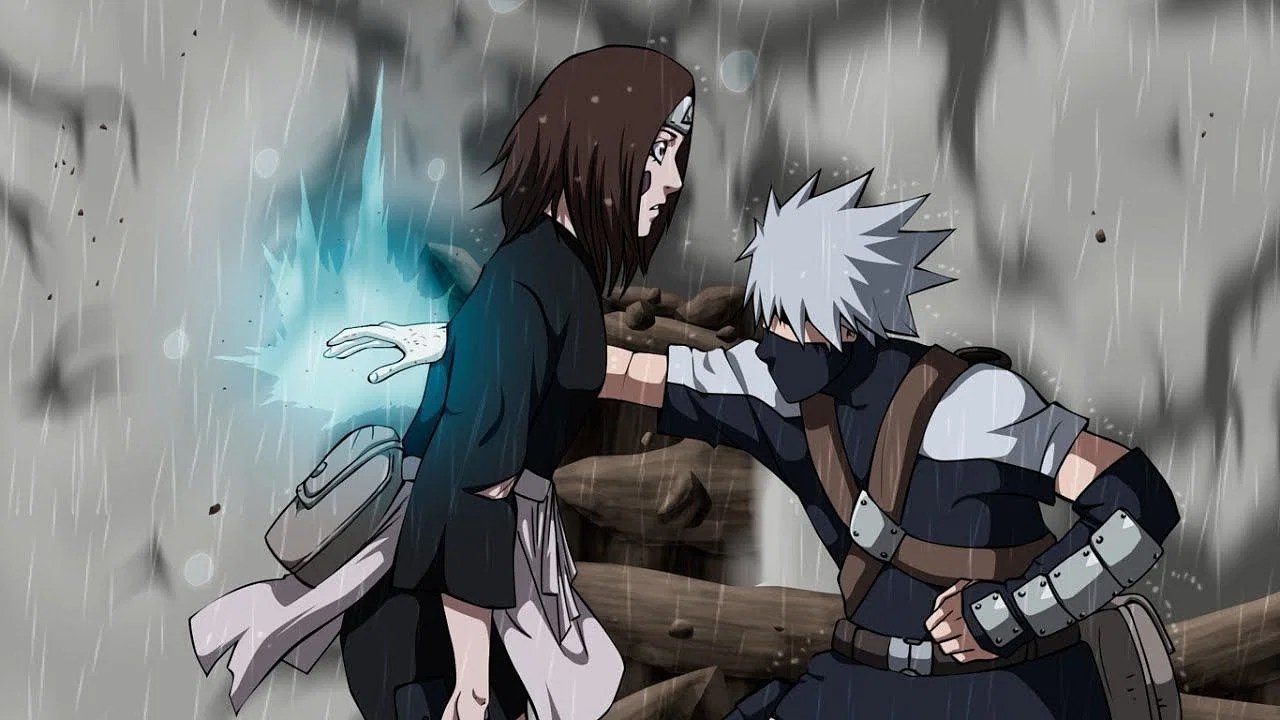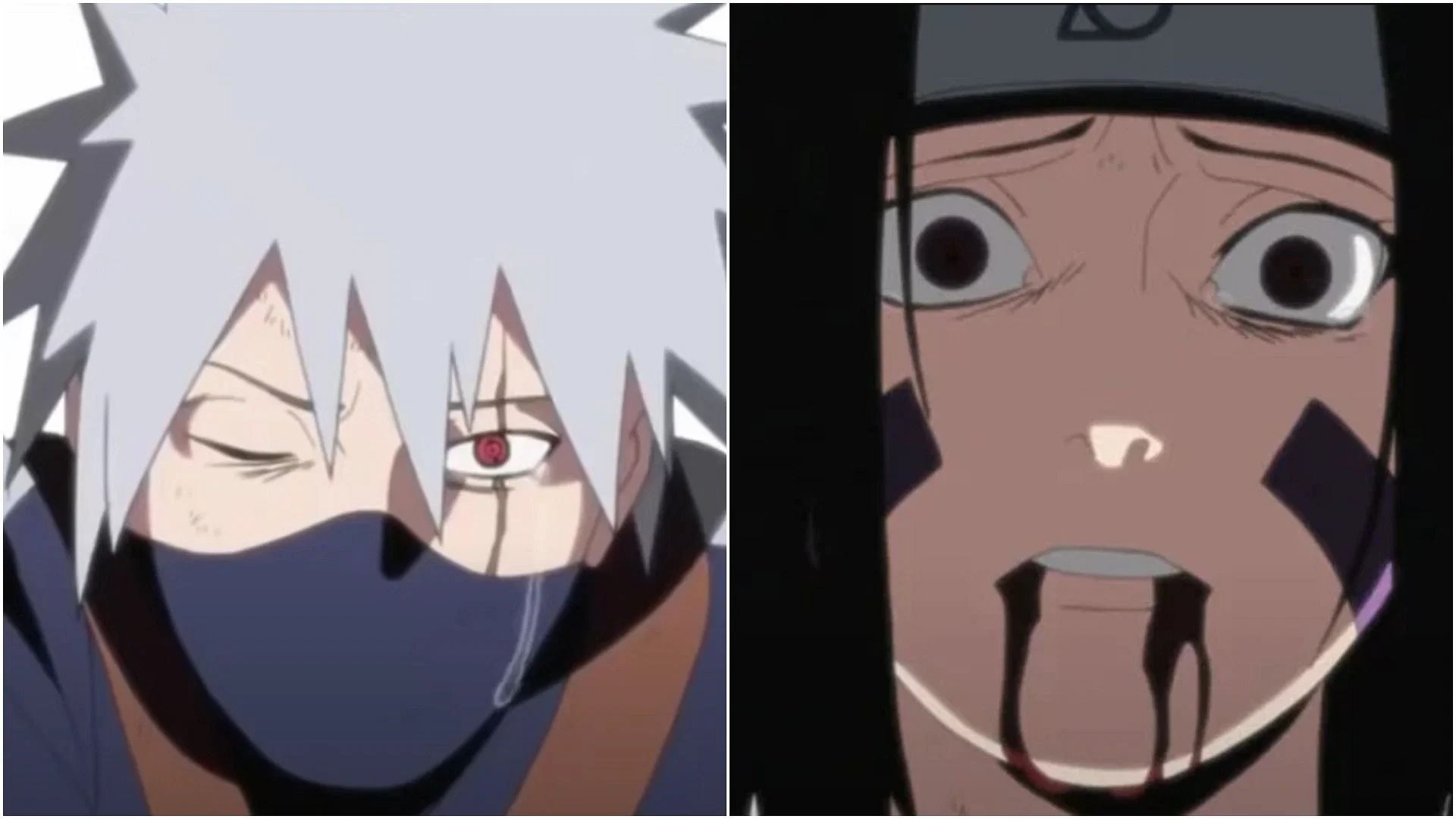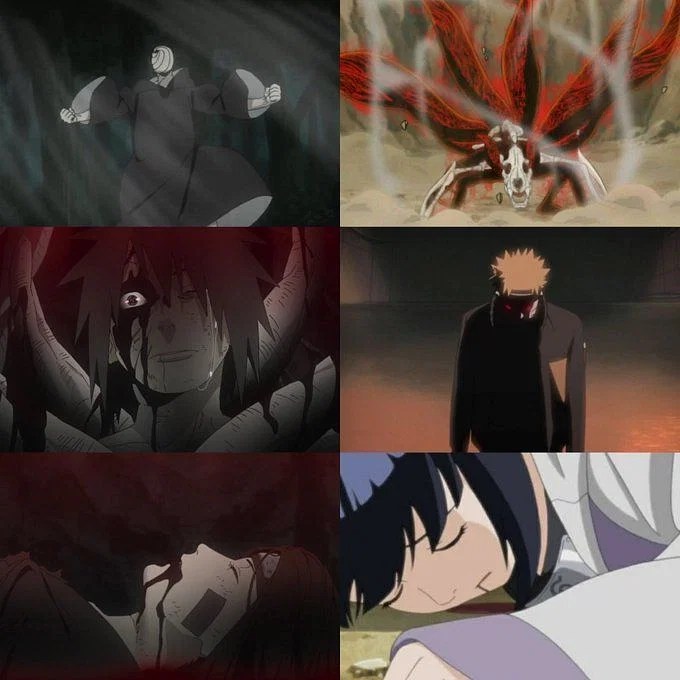Why Kakashi Killed Rin: Unraveling The Mystery
"Why Did Kakashi Kill Rin Unraveling The" is a question that refers to the infamous death of Rin Nohara, a beloved character in the popular anime series Naruto. Rin's demise is a pivotal moment that has long been debated by fans. Kakashi Hatake, another main character in Naruto, is believed to have killed Rin, but the exact circumstances and motives surrounding her death remain unclear.
The question of "Why Did Kakashi Kill Rin Unraveling The" has spawned numerous theories and speculations among fans . Understanding the truth behind Rin's death is not only important for satisfying the curiosity of Naruto enthusiasts but also for shedding light on the complex characters and themes that drive the series.
This article will explore the historical context surrounding Rin's death, examine the different theories and evidence that have been put forth , and attempt to unravel the mystery that has long haunted Naruto fans.
Why Did Kakashi Kill Rin Unraveling The
Unraveling the mystery surrounding Kakashi Hatake's role in Rin Nohara's death is crucial to understanding the complexities of the Naruto universe. Key aspects that shed light on this pivotal event include:
- Betrayal
- Sacrifice
- Obligation
- Love
- Duty
- Friendship
- Trauma
- Redemption
- Ambiguity
These aspects are intricately intertwined, shaping the motivations and actions of the characters involved. Betrayal, sacrifice, and obligation collide in Kakashi's decision to kill Rin, while love, duty, and friendship underscore the emotional turmoil he faces. The trauma of Rin's death haunts Kakashi throughout the series, driving his quest for redemption. However, the ambiguity surrounding her death leaves room for multiple interpretations, adding depth and complexity to the narrative.
Betrayal
Betrayal is a central aspect of the mystery surrounding Kakashi Hatake's killing of Rin Nohara. It encompasses various forms of deceit, broken trust, and the violation of loyalty, which profoundly impact the characters and events in "Naruto".
- Breach of Trust
Kakashi's duty as a shinobi obligated him to protect Rin, but he ultimately failed to do so, leading to her death. This betrayal of trust weighs heavily on Kakashi throughout the series.
- Betrayal of Love
Kakashi and Rin shared a deep bond, and her death was a devastating blow to him. The betrayal of their love and the loss of someone so precious adds another layer of complexity to Kakashi's actions.
- Betrayal of Duty
As a shinobi, Kakashi was tasked with completing missions and protecting his village. However, his decision to kill Rin could be seen as a betrayal of his duty, as it violated the shinobi code of honor.
- Self-Betrayal
Kakashi's choice to kill Rin also represents a form of self-betrayal. He goes against his own moral compass and personal beliefs, causing him immense inner turmoil and shaping his path in profound ways.
The exploration of betrayal in "Why Did Kakashi Kill Rin Unraveling The" highlights the complexities of human nature, the moral dilemmas faced by shinobi, and the lasting consequences of broken trust. It serves as a reminder that even the most honorable individuals can be driven to questionable actions when confronted with extreme circumstances.
Sacrifice
Within the narrative of "Why Did Kakashi Kill Rin Unraveling The", sacrifice plays a pivotal role in shaping the characters' actions and the overall trajectory of the story. Sacrifice, defined as the act of giving up something of value for the sake of something else, is a recurring theme that profoundly influences the decisions and motivations of various individuals.
Kakashi Hatake's decision to kill Rin Nohara is a prime example of sacrifice. Faced with the impossible choice of saving his friend or protecting his village, Kakashi ultimately chooses the latter, believing that Rin's death would prevent the Three-Tailed Beast sealed within her from being used as a weapon. This act of sacrifice weighs heavily on Kakashi throughout the series, shaping his path and driving his quest for redemption.
Beyond Kakashi's actions, sacrifice manifests itself in numerous other ways within the story. Characters such as Minato Namikaze, Jiraiya, and Itachi Uchiha all make significant sacrifices for the sake of their loved ones, their village, or the greater good. These sacrifices serve as powerful reminders of the moral dilemmas and ethical complexities that the characters face in the world of "Naruto".
Understanding the concept of sacrifice in "Why Did Kakashi Kill Rin Unraveling The" provides valuable insights into the human condition and the choices individuals make in the face of adversity. It highlights the power of love, loyalty, and duty, while also exploring the challenges and consequences that arise when these values conflict. By examining the sacrifices made by the characters in the story, readers can gain a deeper appreciation for the complexities of human nature and the moral dilemmas that shape our actions.
Obligation
Within the narrative of "Why Did Kakashi Kill Rin Unraveling The", obligation plays a crucial role in shaping the actions and choices of the characters. Obligation refers to a sense of duty or responsibility that individuals feel towards others or to themselves, and it can significantly influence their decision-making process.
Kakashi Hatake's decision to kill Rin Nohara is a prime example of the interplay between obligation and choice. As a shinobi, Kakashi was obligated to protect his village and its people, even at great personal cost. When faced with the impossible choice of saving Rin or protecting his village, Kakashi ultimately chose the latter, believing that Rin's death would prevent the Three-Tailed Beast sealed within her from being used as a weapon. This decision was driven by his sense of obligation to his village and his duty as a shinobi.
Beyond Kakashi's actions, obligation manifests itself in numerous other ways within the story. Characters such as Minato Namikaze, Jiraiya, and Itachi Uchiha all make significant sacrifices for the sake of their loved ones, their village, or the greater good. These sacrifices are driven by their sense of obligation to those they care about and to the values they hold dear.
Understanding the concept of obligation in "Why Did Kakashi Kill Rin Unraveling The" provides valuable insights into the human condition and the choices individuals make in the face of adversity. It highlights the power of duty, loyalty, and responsibility, while also exploring the challenges and consequences that arise when these values conflict. By examining the obligations that shape the characters' actions in the story, readers can gain a deeper appreciation for the complexities of human nature and the moral dilemmas that shape our actions.
Love
Within the narrative of "Why Did Kakashi Kill Rin Unraveling The", love plays a pivotal role in shaping the actions and choices of the characters. Love, defined as a deep affection and care for another person, is a powerful force that can drive individuals to great sacrifices and acts of selflessness.
The relationship between love and "Why Did Kakashi Kill Rin Unraveling The" is complex and multifaceted. On one hand, love can be a motivating factor for sacrifice and difficult choices. Kakashi Hatake's decision to kill Rin Nohara, for example, was driven by his love for his village and his desire to protect its people. He believed that Rin's death would prevent the Three-Tailed Beast sealed within her from being used as a weapon, thus saving countless lives.
On the other hand, love can also lead to conflict and tragedy. Rin's love for Kakashi and her desire to protect him ultimately led to her own demise. She willingly sacrificed herself to prevent Kakashi from being consumed by the Three-Tailed Beast, a decision that was driven by her deep love and care for him.
Understanding the connection between love and "Why Did Kakashi Kill Rin Unraveling The" provides valuable insights into the human condition and the choices individuals make in the face of adversity. It highlights the power of love to drive both selflessness and sacrifice, while also exploring the challenges and consequences that arise when love conflicts with other values and responsibilities.Duty
In the narrative of "Why Did Kakashi Kill Rin Unraveling The", duty plays a crucial role in shaping the actions and choices of the characters. Duty, defined as a moral or legal obligation to fulfill certain responsibilities, can be a powerful force that drives individuals to make difficult decisions and sacrifices.
The relationship between duty and "Why Did Kakashi Kill Rin Unraveling The" is complex and multifaceted. On one hand, duty can be a motivating factor for heroic actions and acts of selflessness. Kakashi Hatake's decision to kill Rin Nohara, for example, was driven by his duty to protect his village and its people. He believed that Rin's death would prevent the Three-Tailed Beast sealed within her from being used as a weapon, thus saving countless lives.
On the other hand, duty can also lead to conflict and tragedy. Rin's duty to her village and her desire to protect her friends ultimately led to her own demise. She willingly sacrificed herself to prevent Kakashi from being consumed by the Three-Tailed Beast, a decision that was driven by her sense of duty and responsibility.
Understanding the connection between duty and "Why Did Kakashi Kill Rin Unraveling The" provides valuable insights into the human condition and the choices individuals make in the face of adversity. It highlights the power of duty to drive both selflessness and sacrifice, while also exploring the challenges and consequences that arise when duty conflicts with other values and responsibilities.
Friendship
Within the intricate web of "Why Did Kakashi Kill Rin Unraveling The", friendship emerges as a pivotal force that shapes the characters' actions, motivations, and ultimate fates. This multifaceted bond transcends mere companionship, encompassing loyalty, sacrifice, and profound emotional connections.
- Unwavering Loyalty
The friendship between Kakashi, Rin, and Obito formed an unbreakable bond of loyalty. Despite the challenges and tragedies they faced, they stood by each other, unwavering in their support and willingness to sacrifice for one another.
- Heartfelt Sacrifice
Rin's sacrifice to save Kakashi is a testament to the depth of their friendship. She willingly gave up her own life to protect him, demonstrating the ultimate act of love and selflessness.
- Mutual Understanding
The members of Team Minato shared an unspoken understanding that transcended words. They could anticipate each other's thoughts and actions, creating a seamless synergy that strengthened their bond and effectiveness as a team.
- Enduring Legacy
The friendship between Kakashi, Rin, and Obito left an enduring legacy on the world. Their bond shaped their paths and influenced their decisions, ultimately contributing to the outcome of the Fourth Great Ninja War.
Understanding the profound impact of friendship in "Why Did Kakashi Kill Rin Unraveling The" provides valuable insights into the complexities of human relationships. It highlights the power of loyalty, the beauty of sacrifice, the importance of mutual understanding, and the lasting legacy that friendship can create. This exploration deepens our appreciation for the emotional depth of the characters and the enduring themes that resonate throughout the story.
Trauma
The exploration of "Trauma" and its connection to "Why Did Kakashi Kill Rin Unraveling The" provides a deep understanding of the psychological and emotional complexities within the narrative. Trauma, defined as a deeply distressing or disturbing experience that has a significant impact on an individual's physical, emotional, and mental well-being, plays a crucial role in shaping the characters' motivations, choices, and ultimate fates.
The traumatic event that serves as a catalyst for the story is the death of Rin Nohara. Witnessing her demise and being forced to kill her to prevent the Three-Tailed Beast from being unleashed has a profound impact on Kakashi's psyche. The guilt, shame, and grief he experiences as a result of this trauma shape his personality and drive his actions throughout the series. He becomes withdrawn, emotionally distant, and haunted by nightmares, struggling to cope with the psychological scars of that fateful day.
The understanding of trauma in "Why Did Kakashi Kill Rin Unraveling The" extends beyond its immediate impact on the characters. It also highlights the broader societal implications of trauma and its far-reaching effects. The story explores the ways in which trauma can perpetuate cycles of violence, shape political decisions, and create lasting divisions within communities. By examining the consequences of trauma, the narrative encourages readers to reflect on the importance of empathy, compassion, and healing in addressing its devastating effects.
In conclusion, the exploration of "Trauma" and its connection to "Why Did Kakashi Kill Rin Unraveling The" provides valuable insights into the complexities of human behavior and the lasting impact of traumatic experiences. It challenges readers to confront the often unspoken realities of trauma and to consider its broader implications for society as a whole. By shedding light on the psychological and emotional struggles faced by the characters, the narrative encourages empathy, understanding, and a commitment to creating a world where trauma is prevented and its victims are supported on their journey towards healing.
Redemption
In the intricate narrative of "Why Did Kakashi Kill Rin Unraveling The", the concept of "Redemption" emerges as a pivotal force that drives the characters' journeys and shapes their ultimate destinies. Redemption, defined as the act of regaining or restoring something lost, often through suffering or self-sacrifice, plays a crucial role in understanding the motivations, choices, and consequences faced by the characters.
Kakashi Hatake's decision to kill Rin Nohara, a beloved comrade and friend, is a central event that sets the stage for his quest for redemption. Haunted by guilt and remorse over her death, Kakashi embarks on a lifelong journey to atone for his past actions and find inner peace. Through countless battles and personal sacrifices, he seeks to prove his worthiness and make amends for his mistakes.
The exploration of redemption in "Why Did Kakashi Kill Rin Unraveling The" extends beyond Kakashi's personal journey. It also highlights the broader themes of forgiveness, empathy, and the power of second chances. The story challenges readers to confront the complexities of human nature and the possibility of redemption even in the darkest of circumstances. By examining the characters' struggles and triumphs, the narrative encourages us to reflect on our own capacity for growth and the importance of seeking redemption when necessary.
In conclusion, the connection between "Redemption" and "Why Did Kakashi Kill Rin Unraveling The" provides a deep understanding of the human psyche and the enduring power of hope. It demonstrates that redemption is not merely a destination but an ongoing process that requires courage, perseverance, and a willingness to confront one's past. The story serves as a reminder that even in the face of adversity, the pursuit of redemption can lead to personal transformation and a deeper appreciation for the fragility of life.
Ambiguity
In the gripping narrative of "Why Did Kakashi Kill Rin Unraveling The", the concept of "Ambiguity" weaves an intricate web, casting a shadow of uncertainty and mystery over the events that transpired. This ambiguity manifests in various forms, each contributing to the enigmatic nature of the story.
- Uncertain Motivations
Kakashi's reasons for killing Rin remain shrouded in ambiguity. Whether his actions were driven by duty, compassion, or a combination of both is a matter of conjecture, leaving readers to grapple with the complexities of his decision.
- Conflicting Accounts
The story surrounding Rin's death is riddled with conflicting accounts. Kakashi's own recollections, as well as the perspectives of other characters, offer fragmented and sometimes contradictory details, adding to the puzzle.
- Hidden Truths
Certain aspects of the event remain concealed, buried beneath layers of secrecy and unspoken truths. The full extent of what happened that fateful day may never be fully revealed, further fueling the ambiguity surrounding Rin's demise.
- Moral Dilemmas
Kakashi's choice to kill Rin raises profound moral dilemmas. The boundaries between right and wrong blur, as the characters navigate a treacherous path fraught with impossible choices and unintended consequences.
The ambiguity in "Why Did Kakashi Kill Rin Unraveling The" serves as a powerful storytelling device, inviting readers to actively engage with the narrative and form their own interpretations. It challenges our assumptions, encourages critical thinking, and ultimately enhances the emotional impact of the story.
In conclusion, the exploration of "Why Did Kakashi Kill Rin Unraveling The" delves into the profound depths of human nature, moral dilemmas, and the complexities of duty and sacrifice. Kakashi's decision to kill Rin remains a pivotal moment that reverberates throughout the narrative, shaping his destiny and the lives of those around him.
Key points that emerge from this exploration include the intricate interplay of love, friendship, and obligation in shaping our actions, the enduring impact of trauma on the human psyche, and the elusive nature of redemption.
Ultimately, "Why Did Kakashi Kill Rin Unraveling The" invites us to reflect on the choices we make, the consequences they carry, and the complexities that often lie beneath the surface of human behavior. It serves as a timeless reminder that even in the darkest of times, the pursuit of redemption can offer a glimmer of hope and the possibility of a brighter future.
All about mark cuban s wife get
Rebecca front biography net worth married husband
Lebron james wiki biography family age height



ncG1vNJzZmiqmaKvpnrApqpsZpSetKrAwKWmnJ2Ro8CxrcKeqmebn6J8uLTYZpuinF2grqyt0qGgZqOZobluvsinZK6mopbDprjIp55mrJiae6nAzKU%3D